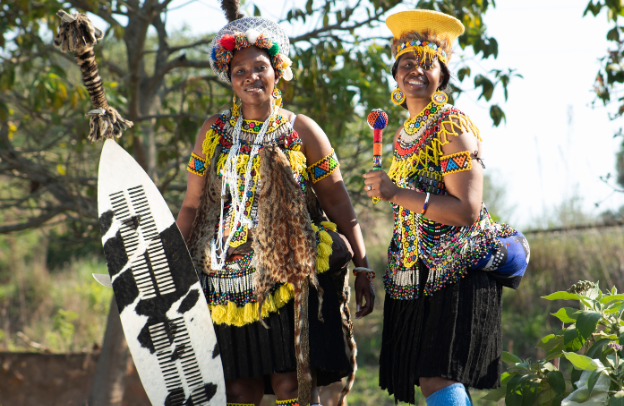Helping Diasporans Discover New Collaborative Business Opportunities through Group Tours

In an ever increasingly globalized world, the notion of business collaboration has expanded beyond borders. The African diaspora with over 200 million people, spread across continents, is exploring new avenues of partnership that not only benefit their local communities but also strengthen the ties between Africa and its global diaspora.
Learn How to Leverage Your Story through our Story To Asset Framework.
Group travel, traditionally seen as a recreational activity, has now emerged as a significant catalyst for economic growth, particularly in fostering collaborative business opportunities. Through group travel, diasporans have the chance to reconnect with their roots, explore new business prospects, and invest in ventures that transcend geographical limitations.
This rising trend of group travel as a business tool is transforming how African diaspora communities interact with the continent. The opportunities extend far beyond just sightseeing, they encompass sustainable investments, business collaborations, and knowledge-sharing.
What makes group travel particularly compelling is its ability to facilitate meaningful connections between diasporans and local entrepreneurs, creating an ecosystem of innovation, knowledge exchange, and joint business ventures.
See also The Importance of Collaboration for a Stronger African Diaspora – WeDiasporan Volunteer Series 16/21
By visiting Africa and engaging in collaborative tours, diasporans are finding business opportunities that not only fulfill their entrepreneurial aspirations but also contribute to the socio-economic development of the continent.
Group Tourism as a Bridge for Collaboration
Group travel offers a unique platform for diasporans to discover business opportunities that they might not otherwise encounter. Historically, many African diaspora communities have been disconnected from Africa’s burgeoning markets due to geographic distance and limited knowledge about local opportunities.
However, as global travel becomes more accessible, group travel has emerged as a tool to bridge this gap.
Tours designed specifically for diasporans to visit their ancestral homes offer much more than a cultural reconnection. They create a space where both local business owners and tourists can meet, exchange ideas, and forge collaborations.
See also Navigating the Digital Space: How Podcasting Helps Diaspora Entrepreneurs Position Their Brand
These business-minded tours often include visits to local markets, businesses, and even government-supported development initiatives, giving diasporans direct insight into Africa’s growing sectors such as agriculture, technology, travel, and renewable energy.
For example, Ghana’s “Year of Return” campaign, which was launched to mark the 400th anniversary of the first enslaved Africans arriving in America, successfully blended travel with business.
As a result, it became a platform for diasporans to invest in local businesses, collaborate with African entrepreneurs, and explore new avenues for partnerships. This initiative was not only a homecoming but also a turning point in how African Americans saw their potential to engage economically with the continent.
Expanding Business Networks
According to the World Economic Forum publication “How Tapping into the Power of the Global Black Economy Can Boost Africa’s Innovation and Prosperity,” the African diaspora represents a rapidly growing and influential global demographic.
With over 200 million people of African descent living outside the continent and more than 1.4 billion residing within Africa, this collective population is poised to comprise over 25% of the global population in the near future.
This demographic shift highlights a powerful opportunity to strengthen group travel and business networks among African diasporans, fostering cultural exchange, economic development, and deeper pan-African connections that can drive innovation and shared prosperity.
For many diasporans, discovering new business opportunities in Africa through group travel is about more than just establishing a profitable venture. It’s about forging long-term, mutually beneficial relationships with local entrepreneurs.
In the past, networking across continents was challenging; businesses had to rely on intermediaries or secondhand information. Group travel eliminates this distance, providing diasporans with firsthand access to Africa’s diverse business landscape.
Group tours often serve as more than just cultural experiences—they are strategic platforms for connection and collaboration. Participants are frequently introduced to influential local business leaders, government officials, and representatives from international organizations, opening the door to meaningful partnerships.
These engagements have sparked cross-sector collaborations in areas such as agribusiness, infrastructure, digital technology, and renewable energy.
Through these networks, members of the African diaspora gain opportunities to invest in local startups or expand their own ventures, leveraging the insights, relationships, and capital acquired during their travels.
This vision is championed by Obehi Ewanfoh, founder of WeDiasporan and host of the Obehi Podcast, where he has interviewed over 1,000 individuals from across the global African diaspora. His work emphasizes the transformative power of collaboration, both within the diaspora and between the diaspora and the African continent.
See also Enhancing Connections and Impact Through Community Outreach – WeDiasporan Volunteer Series 3/21
This mission is embodied in our initiative, the SANKOFA: Retracing My African Roots. More than a travel program, DTE is a powerful cultural journey designed to reconnect diasporans with the heart of their heritage, strengthening identity, forging new networks, and laying the groundwork for long-term economic and social impact.
An example of this can also be seen in how Nigerian-American entrepreneurs have used group tours to strengthen partnerships between Nigeria and the United States.
Many group tours to Nigeria have seen participants directly engage with local innovators, fueling collaborative projects in technology and agriculture. Through this engagement, new business opportunities have been discovered, and several diasporans have returned to Nigeria to start joint ventures.
The Role of Knowledge Sharing in Business Opportunities
In addition to networking, group travel creates spaces for the sharing of knowledge and expertise. One of the most powerful aspects of these tours is the opportunity for diasporans to contribute their skills and experience to local business ventures.
Many group tours now incorporate workshops, seminars, and mentorship programs where participants can offer advice, collaborate on solutions, or even develop business ideas with local partners.
See also Creating Connections and Expanding Your Network for Social Impact: WeDiasporan Volunteer Series 5/21
The African diaspora’s global experience provides a valuable resource for business owners in Africa who may be unfamiliar with international market trends, management practices, or digital tools.
Similarly, diasporans benefit from understanding the local context, consumer behavior, and regulatory environment in which African businesses operate. This knowledge exchange helps to build a robust foundation for future collaborations.
Take the case of the “Diaspora Invest” program, which focuses on fostering investment opportunities between diasporans and African businesses. Through group travel initiatives, participants not only get to see the businesses they might invest in but also contribute their expertise in finance, marketing, and global trade.
This collaborative learning model enhances the potential for sustainable, cross-border business ventures that would not have been possible without the exchange of ideas and resources.
Discovering Opportunities in Africa’s Emerging Markets
Africa is home to some of the fastest-growing economies in the world, with new business opportunities emerging across various sectors. Group travel exposes diasporans to the pulse of these markets, offering them a firsthand understanding of Africa’s potential.
See also Sustainable Principles for Impactful Business: Dr. Renuka Thakore’s Vision for a Resilient Future
By visiting places like Kenya, Rwanda, Ethiopia, and Nigeria, diasporans are able to witness the growth of industries such as mobile technology, renewable energy, fintech, and agriculture, all of which present attractive investment opportunities.
In countries like Kenya, the rise of mobile banking and financial technology has opened up new ways for diasporans to engage in the economy. Group travel allows visitors to learn from local fintech entrepreneurs and explore potential collaborations in this growing sector.
Similarly, in Nigeria, where the agricultural sector is a major driver of the economy, diasporans are able to partner with local farmers and agribusinesses to promote sustainable practices, improve food security, and create economic opportunities.
Through group tours that include site visits to these industries, participants gain insights into Africa’s emerging markets, enabling them to identify where their investments could have the greatest impact.
These tours can also help diasporans uncover opportunities for joint ventures with local businesses, expanding their networks, and fostering growth in high-potential sectors.
The Role of Government and Institutional Support
Government support is crucial in creating an enabling environment for collaborative business opportunities between diasporans and local businesses. Many African governments are now recognizing the potential of the diaspora and are actively encouraging business partnerships through policies and incentives.
See also Diaspora Group Tours: A Collaborative Pathway to Empowerment and Cultural Reclamation
Group travel often includes meetings with government officials, trade representatives, and investment organizations who are eager to highlight the various opportunities available to the diaspora.
In recent years, African governments have increasingly embraced the concept of diaspora-driven development. Initiatives such as the African Union’s Diaspora Policy, the African Development Bank’s High-Level Panel on Diaspora Investment, and various government-backed diaspora engagement programs have created a favorable environment for diasporans to invest and collaborate with local businesses.
Strengthening Business Ecosystems
Group travel is not just about individual business opportunities but also about strengthening entire business ecosystems. As diasporans travel in groups, they bring with them a wealth of knowledge and resources that can benefit local businesses on a larger scale.
Through partnerships, joint ventures, and business incubation programs, diasporans help to elevate the capabilities of local entrepreneurs and strengthen Africa’s business ecosystem.
For example, in South Africa, group travel has led to collaborations in the renewable energy sector, where diasporans with experience in solar energy have worked with local businesses to implement sustainable energy solutions in underserved communities.
These types of collaborations improve local infrastructure while providing new markets for diasporans to invest in.
Conclusion: A Bright Future for Diaspora Business Collaboration
The intersection of group travel and business collaboration is a powerful force for economic development in Africa. Through group tours, diasporans are discovering new business opportunities, sharing their expertise, and fostering relationships that transcend geographical and cultural boundaries.
See also Plantain: How Agri-Entrepreneurs Can Capitalize on an Untapped Potential
These collaborative partnerships not only benefit businesses but also contribute to the overall development of the continent, ensuring that the economic benefits of diaspora engagement are felt on both sides.
As more diasporans embrace group travel as a means of discovering new business opportunities, Africa’s growth potential will continue to expand.
By investing in sustainable businesses, supporting local entrepreneurs, and forging long-term collaborations, the African diaspora can play a pivotal role in driving economic transformation on the continent.
Through group travel, the African diaspora is no longer a distant observer but an active participant in Africa’s business future. With each journey, each partnership, and each investment, diasporans are helping to build a brighter, more connected world, one collaboration at a time.
Learn How to Leverage Your Story through our Story To Asset Framework.





